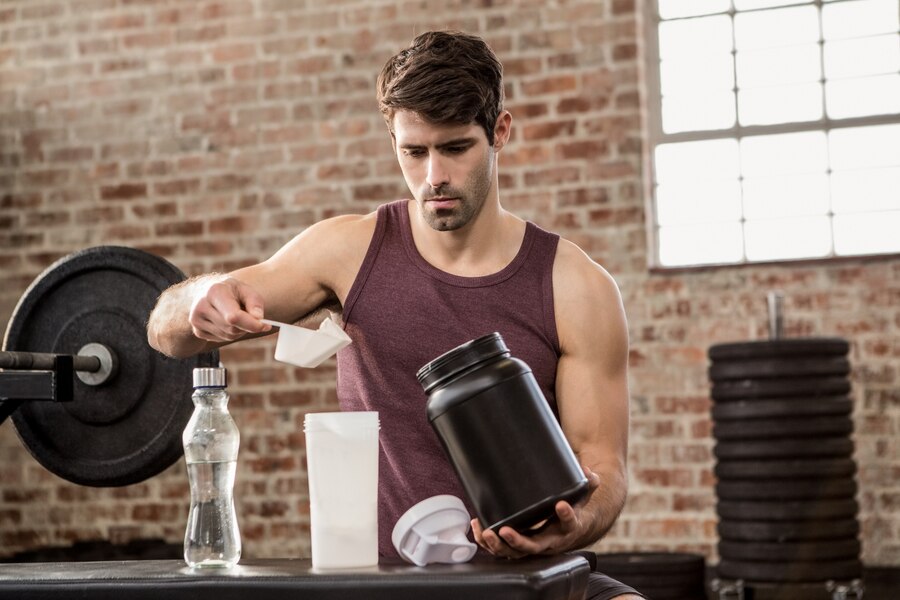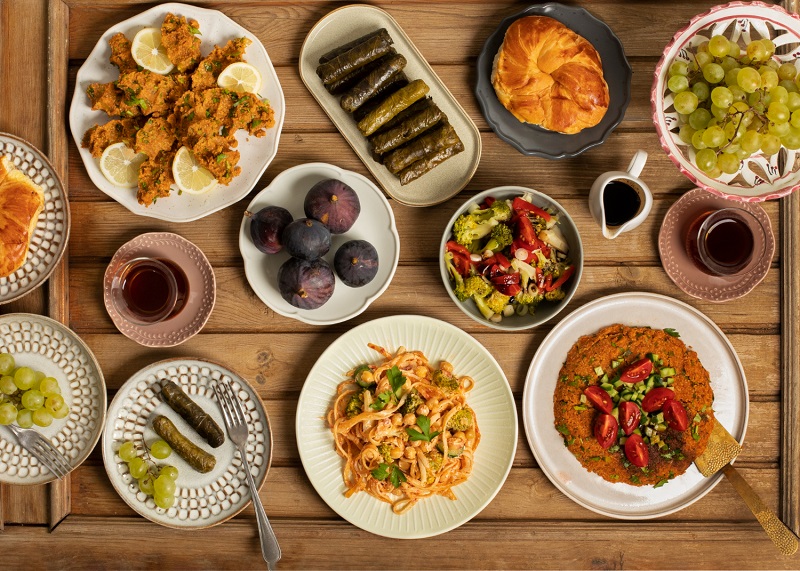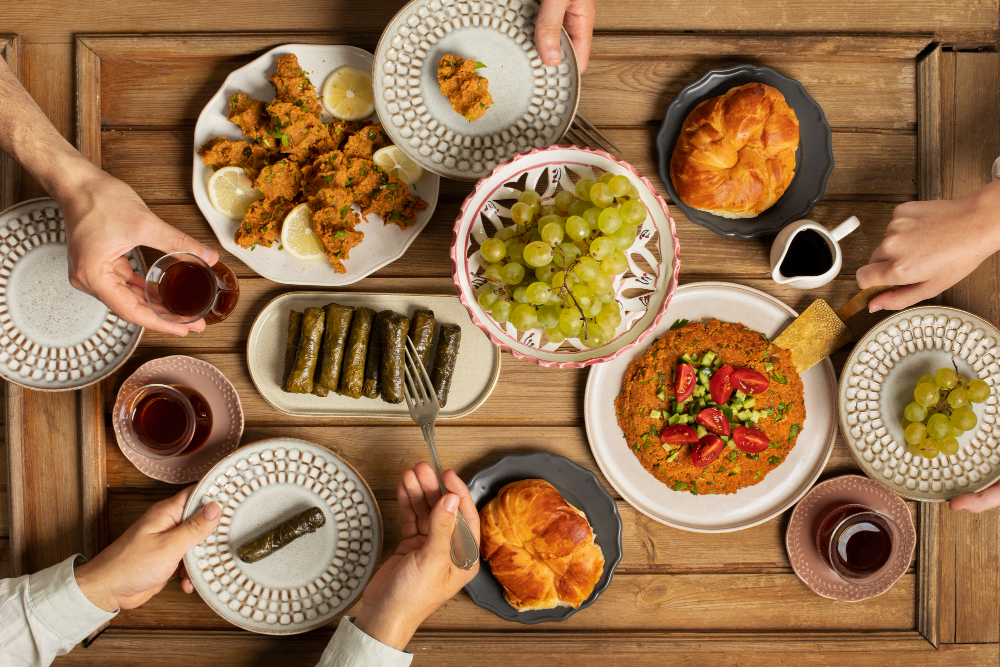Building muscle can be tough during Ramadan, especially with all the fasting! For those observing Ramadan, it’s a challenge to keep those hard-earned muscles while going without food and drink from dawn to dusk. This guide will help you out! We’ve looked at a bunch of research to give you some science-backed tips to maintain your muscle mass throughout Ramadan. This way, you can keep working towards your fitness goals while still observing this important religious practice.
Table of Contents
First, let’s understand what helps your muscles stay strong. Studies show that eating at the right times, getting enough protein, and exercising smartly can all help prevent your body from breaking down muscle. By following these steps during Ramadan, you can minimize the impact of fasting on your muscles.
Key Takeaways
- Exercise Timing: Workout after your early morning meal (Suhoor) or evening meal (Iftar) for more energy.
- Not Too Hard: Do exercises that make you work but not so hard that you feel too tired or thirsty.
- Keep It Short: Aim for workouts that last 30 to 45 minutes so you can keep it up during Ramadan.
- Drink Water: Make sure to drink a lot of water when you’re not fasting to stay hydrated.
- Eat Right: Include foods that are good for your muscles and give you energy in your meals at Suhoor and Iftar.
Important Note: Maintaining muscle mass during Ramadan requires a delicate balance between adequate nutrition, appropriate exercise intensity, and timing. Consulting with a healthcare professional or a certified fitness trainer before embarking on this regimen is highly recommended, especially for individuals with pre-existing health conditions.
When Is the Best Time to Workout for Muscle Mass During Ramadan Fasting?
The timing of workouts during Ramadan can significantly impact muscle maintenance. Due to the fasting schedule, many individuals choose to exercise either before or after their evening meal (Iftar). However, the optimal time may vary based on individual preferences and energy levels.
Some prefer to work out after Iftar, as they may have more energy and hydration levels are replenished. Others find it more suitable to exercise before Suhoor (pre-dawn meal) to ensure they have enough energy for the day ahead. Experiment with different timings to find what works best for you.
How to Maintain Muscle Mass During Ramadan Fasting?
1. Plan Your Workouts Wisely
During Ramadan, it’s super important to think about when and how you work out so you don’t get too tired. Here’s a cool idea: try short workouts that really get you moving but don’t take too much time.
Also, do exercises that work out many muscles at once. Squats, deadlifts, and bench presses are great examples. This way, you get a lot of benefits quickly without wearing yourself out.
2. Keep Track of Your Protein Intake
Protein is super important for keeping your muscles strong and helping them fix themselves. During Ramadan, make sure you eat enough foods that are rich in protein during the times you can eat.
Foods like lean meats, fish, eggs, dairy products (like milk and cheese), legumes (like beans and lentils), and nuts are packed with protein. These foods can help you keep your muscle strength up.
3. Don’t Lose Control Of Your Calorie Intake
When fasting, it’s really important to eat a balanced diet to keep from losing muscle. Try not to eat too much during Iftar and Suhoor because eating too many calories might make you gain weight instead of keeping your muscles strong.
Choose foods that are full of nutrients and give you energy all day long. This way, you stay healthy and keep your muscles in good shape.
4. Keep Hydration in Check
Drinking enough water is very important for keeping your muscles working right and for your overall health. During Ramadan, make sure to drink lots of water when you’re not fasting to keep yourself hydrated.
Try to stay away from drinks with a lot of sugar and caffeine, like soda and coffee, because they can make you lose more water.
5. Keep An Eye On Your Muscle Mass during Ramadan fasting
Keep an eye on your muscle size during Ramadan to see how you’re doing. You might use special tools that tell you about different parts of your body or talk to a doctor or health expert to see if your muscles are staying strong.
If you notice any changes, you can change how you exercise or what you eat to help keep your muscles strong.
6. Don’t overeat
After you fast, you may feel like eating a ton. But if you eat too much, it can upset your stomach and lead to gaining extra weight. Instead, eat a little at a time and choose foods that are really healthy for you, not packed with too many calories.
This helps you give your body what it needs without going overboard.
7. You probably won’t lose significant muscle mass
Despite fasting during Ramadan, most individuals do not experience significant muscle loss if they maintain a balanced diet and exercise regimen. Focus on consistency and listen to your body’s signals to ensure you’re meeting your fitness goals.
In conclusion, maintaining muscle mass during Ramadan fasting requires careful planning and attention to nutrition and hydration. By following these workout tips, you can preserve muscle mass and stay healthy during this holy month.
FAQs
Is it okay to work out while fasting during Ramadan?
Yes, it’s generally safe to exercise while fasting during Ramadan. However, listen to your body and adjust your workout intensity and timing as needed to avoid fatigue and dehydration.
How can I stay motivated to workout during Ramadan?
Staying motivated during Ramadan can be challenging, but setting realistic goals, finding a workout buddy, and varying your routine can help keep you motivated and on track with your fitness goals.
How to keep muscles mass during Ramadan?
To maintain muscle during Ramadan, focus on eating enough protein-rich foods during non-fasting hours. Also, try to do light exercises like walking or stretching during the day to keep your muscles active.
How can I exercise during Ramadan fasting?
You can exercise during Ramadan by choosing lighter activities like yoga or gentle stretching. It’s also important to hydrate well before and after your workout.
Can I build muscle during Ramadan?
Building muscle during Ramadan is challenging due to the limited eating hours and energy levels. However, you can maintain muscle mass by eating protein-rich foods and doing light exercises.
How do I prevent muscle loss while fasting?
To prevent muscle loss during fasting, make sure to eat enough protein and stay hydrated. Additionally, avoid intense workouts and focus on lighter activities.









Can you be more specific about the content of your article? After reading it, I still have some doubts. Hope you can help me.
Thank you for your sharing. I am worried that I lack creative ideas. It is your article that makes me full of hope. Thank you. But, I have a question, can you help me?